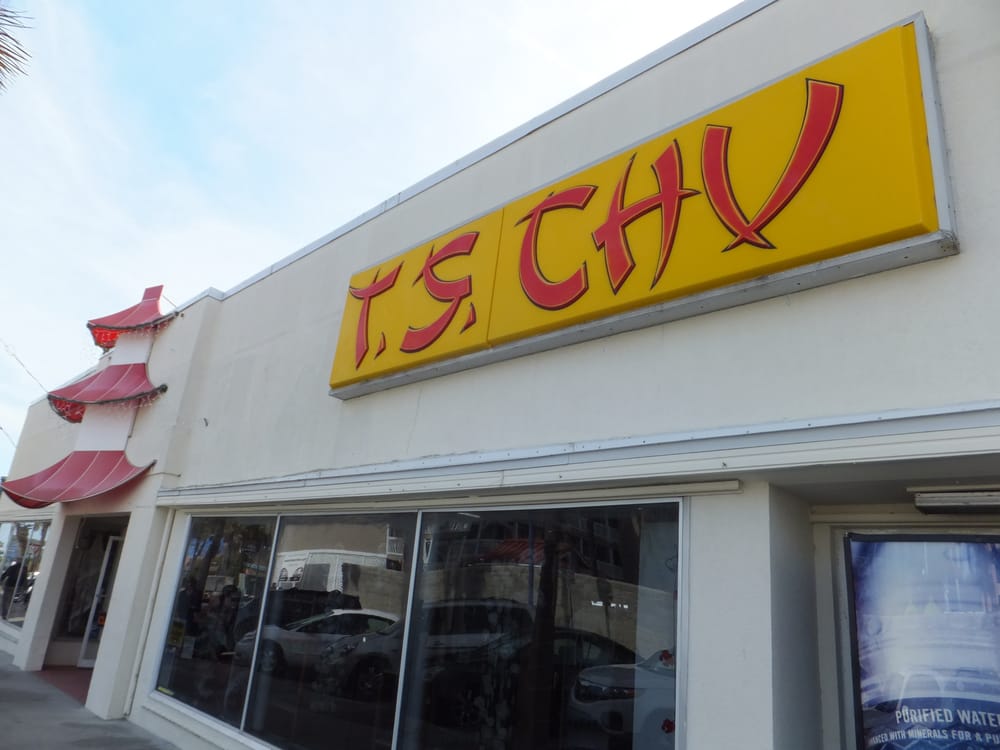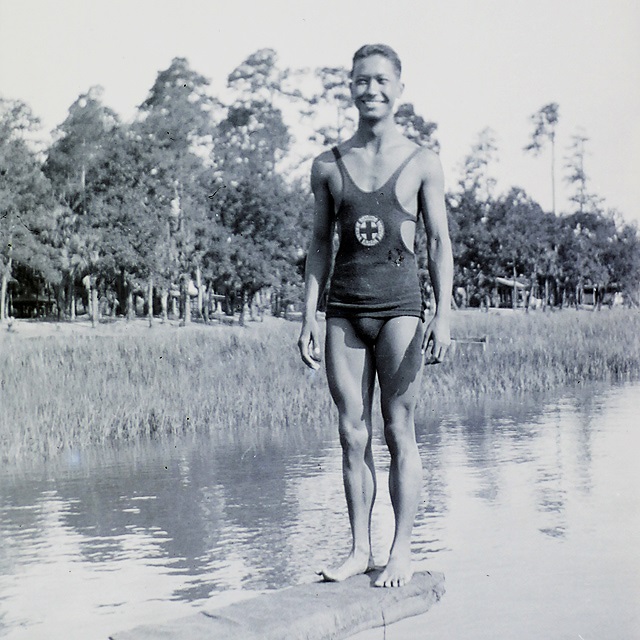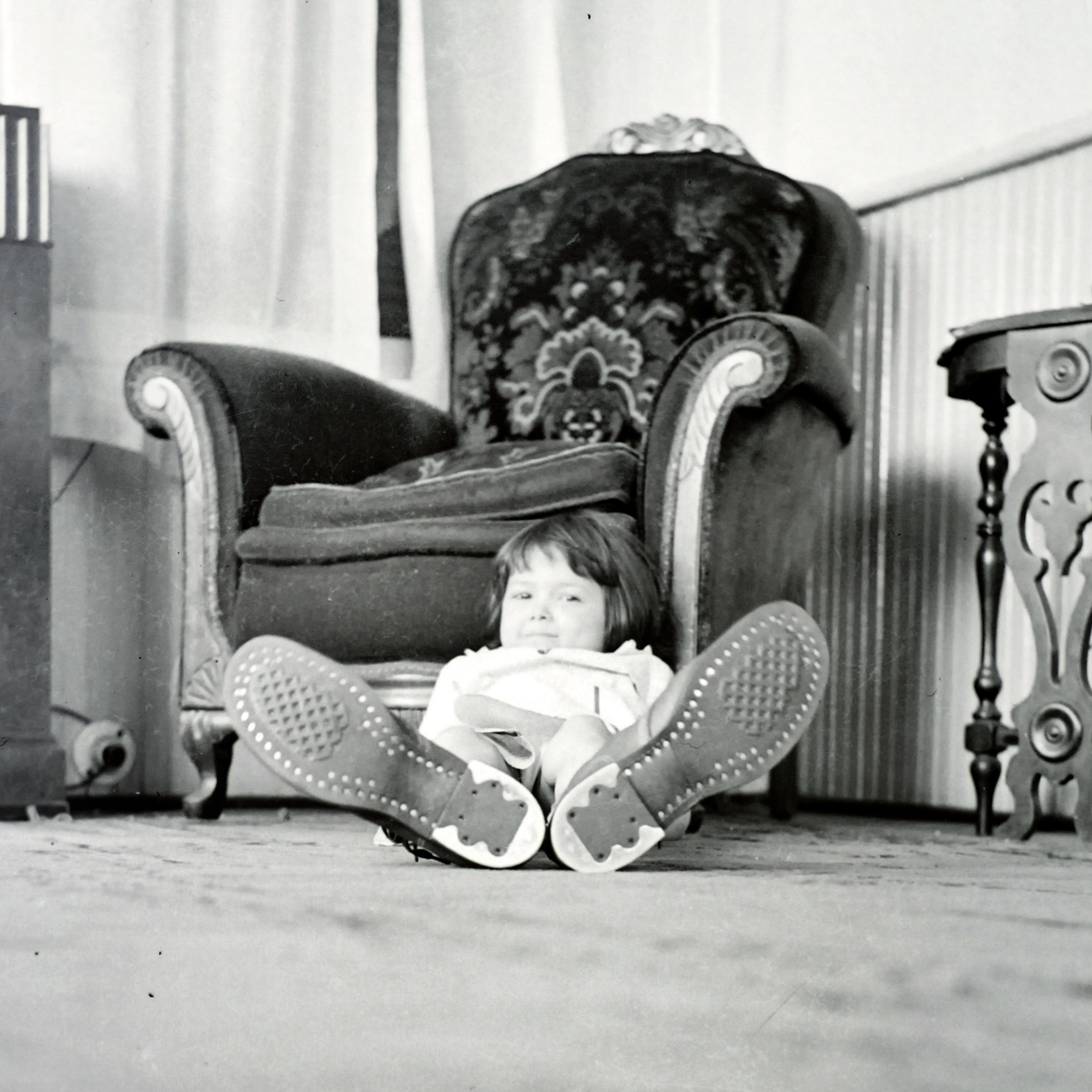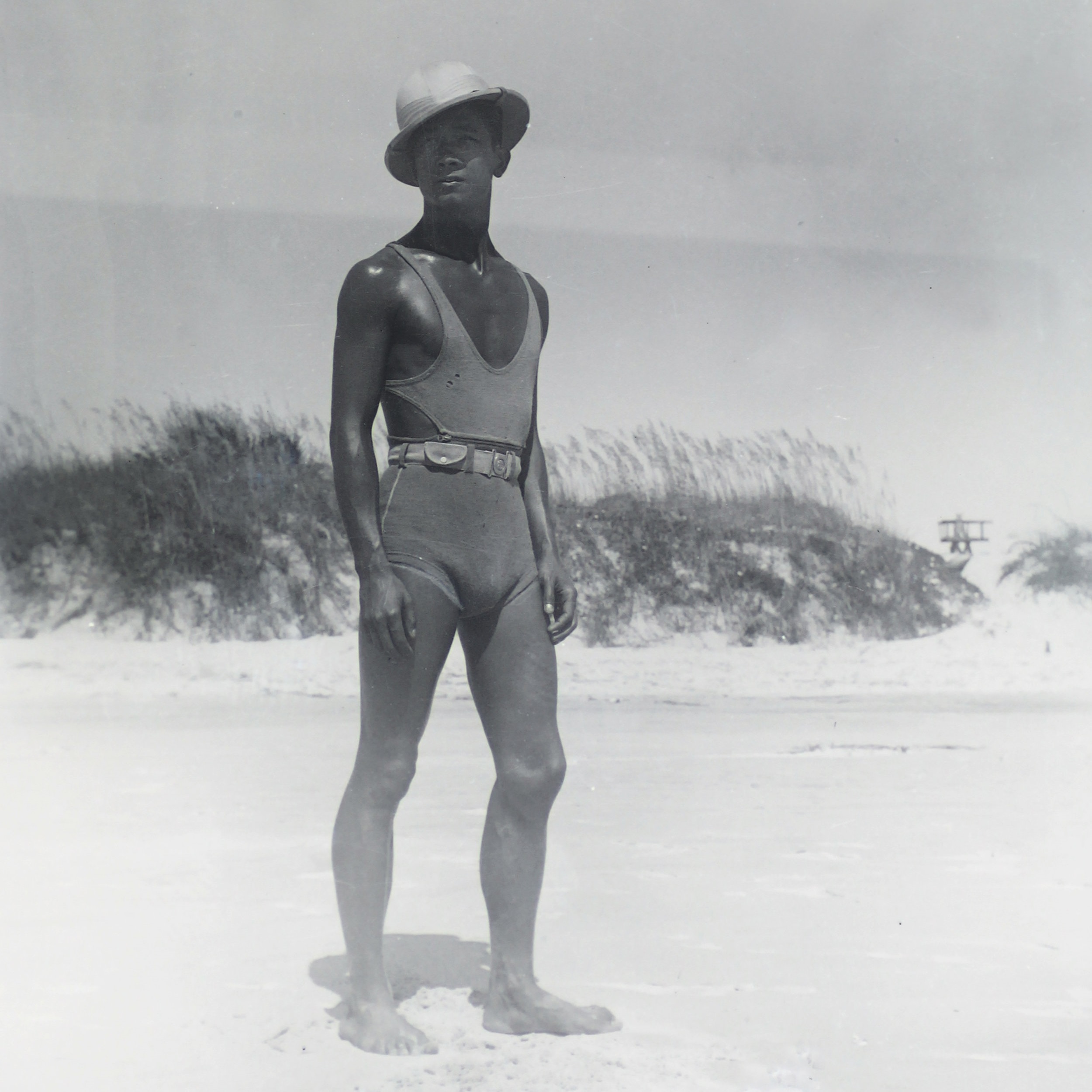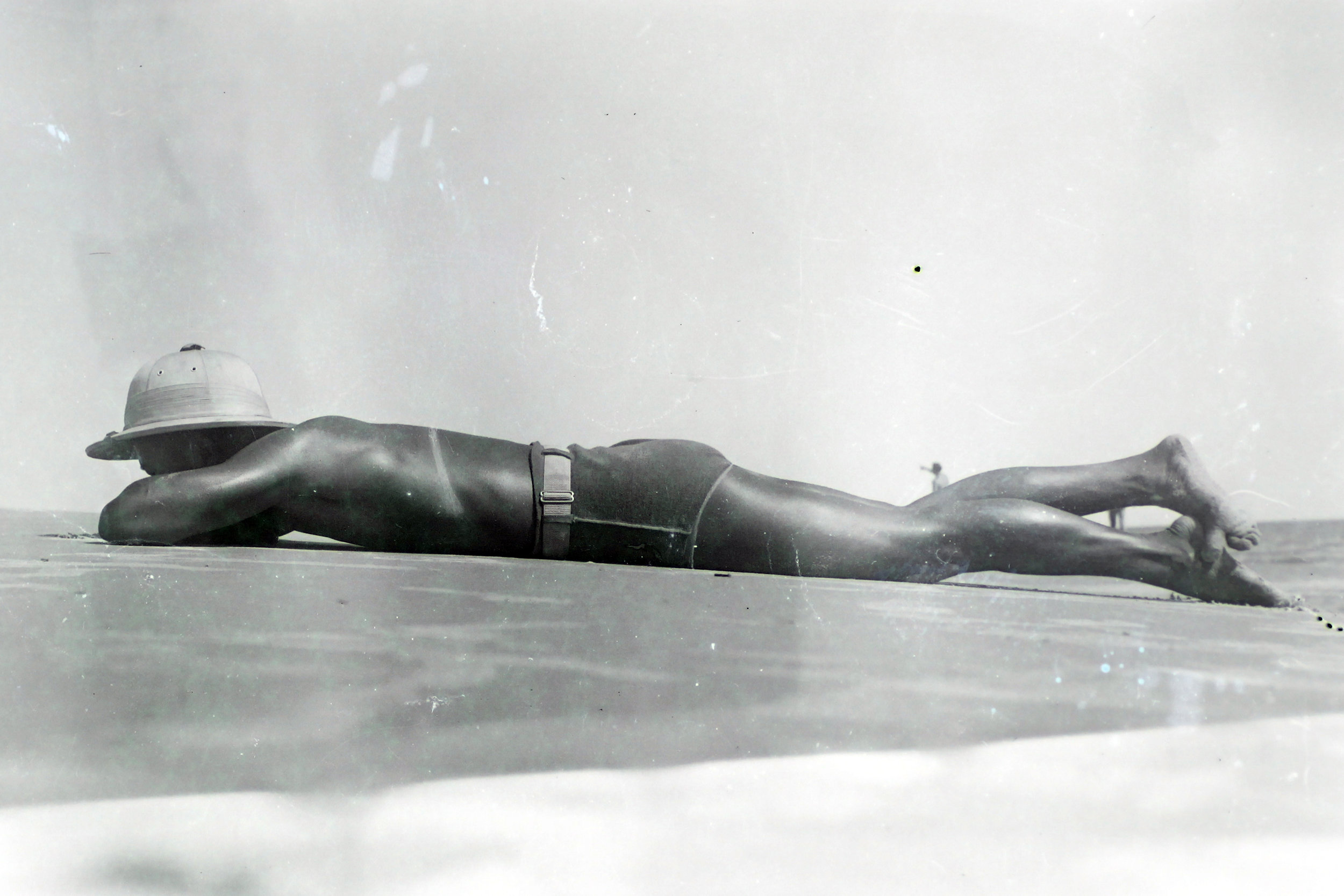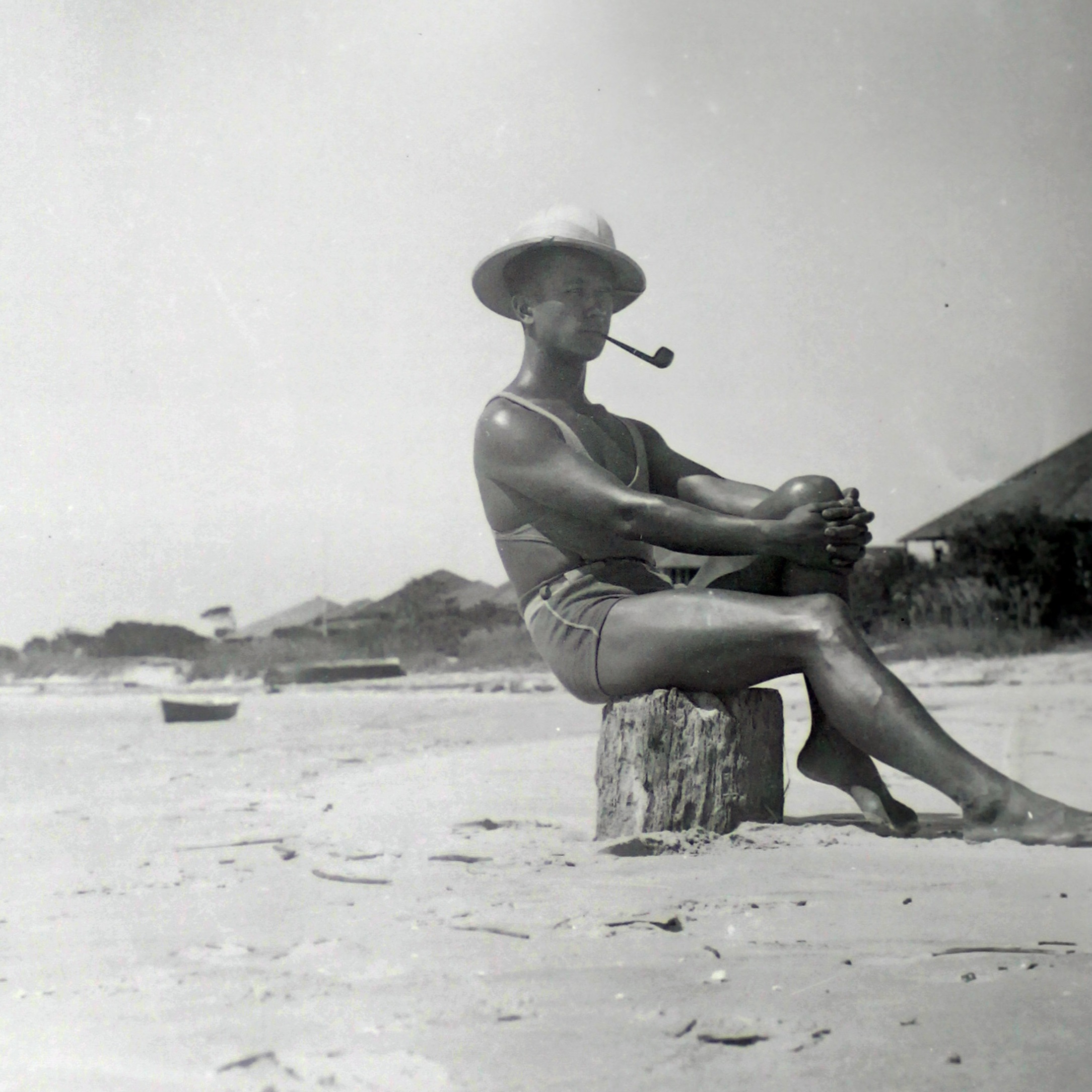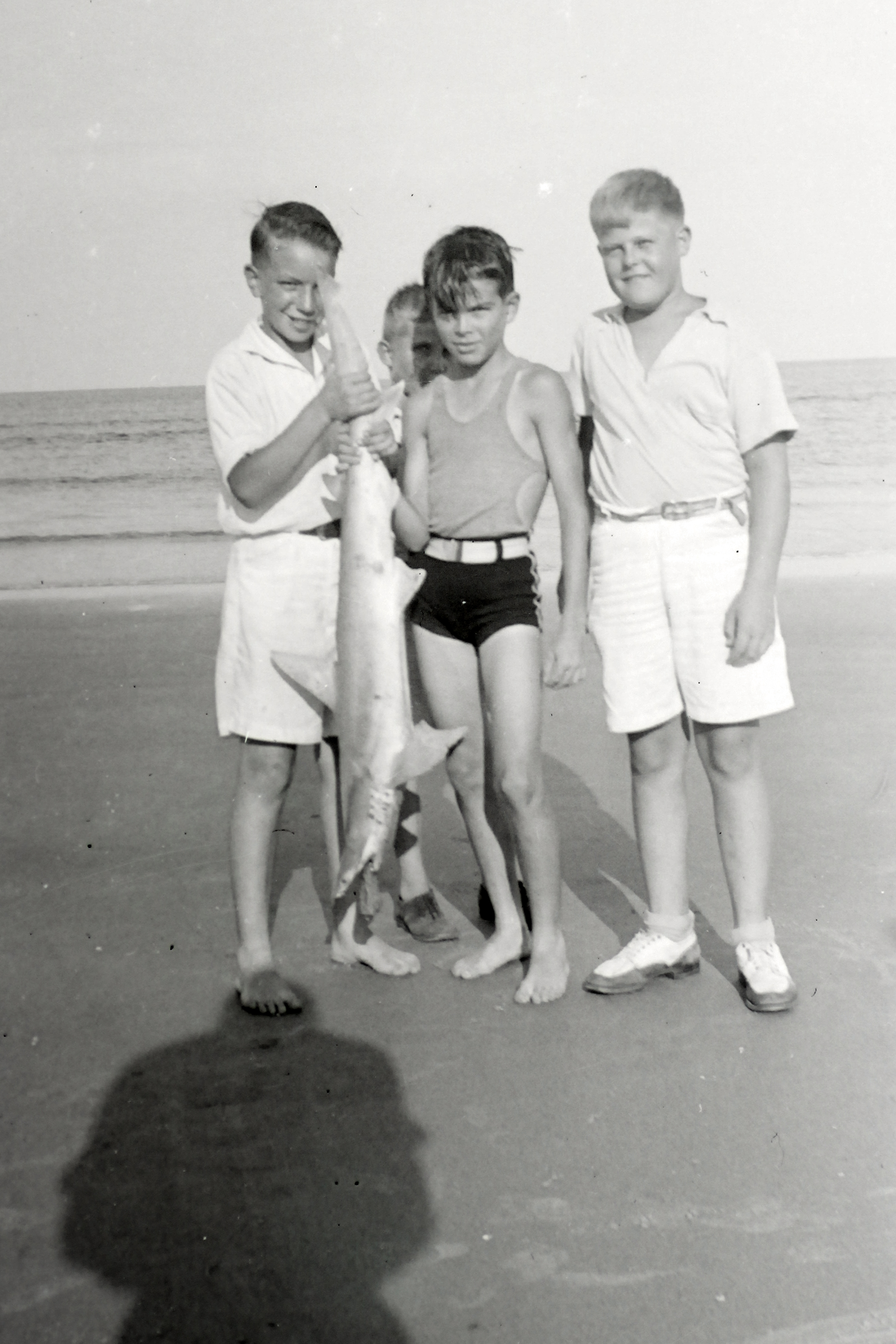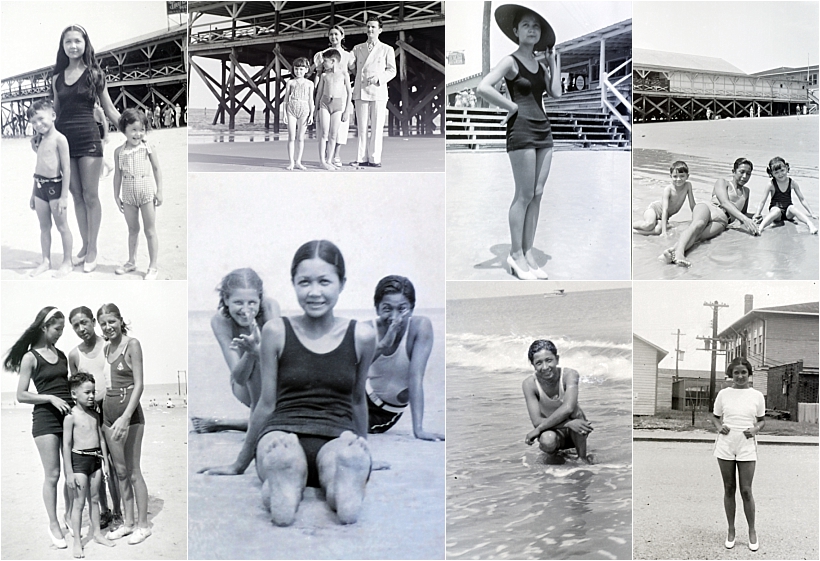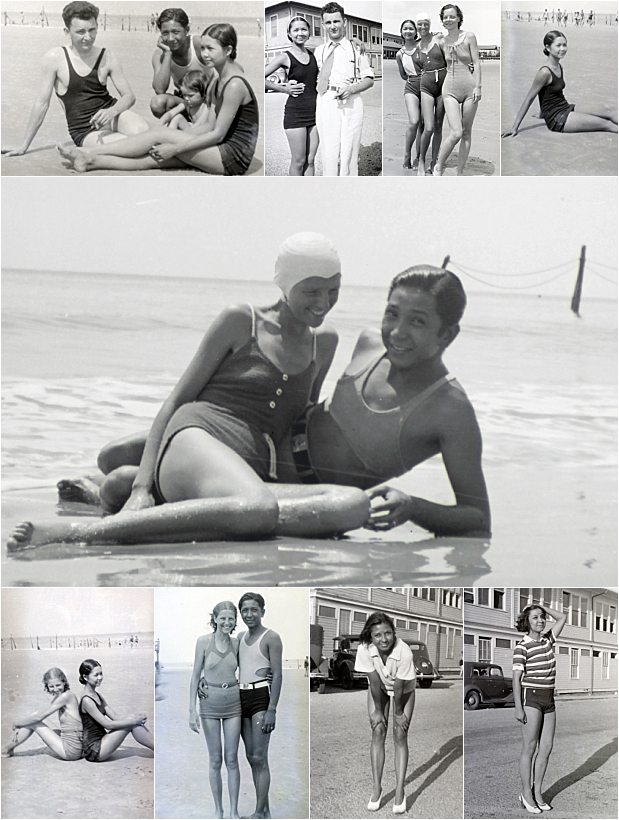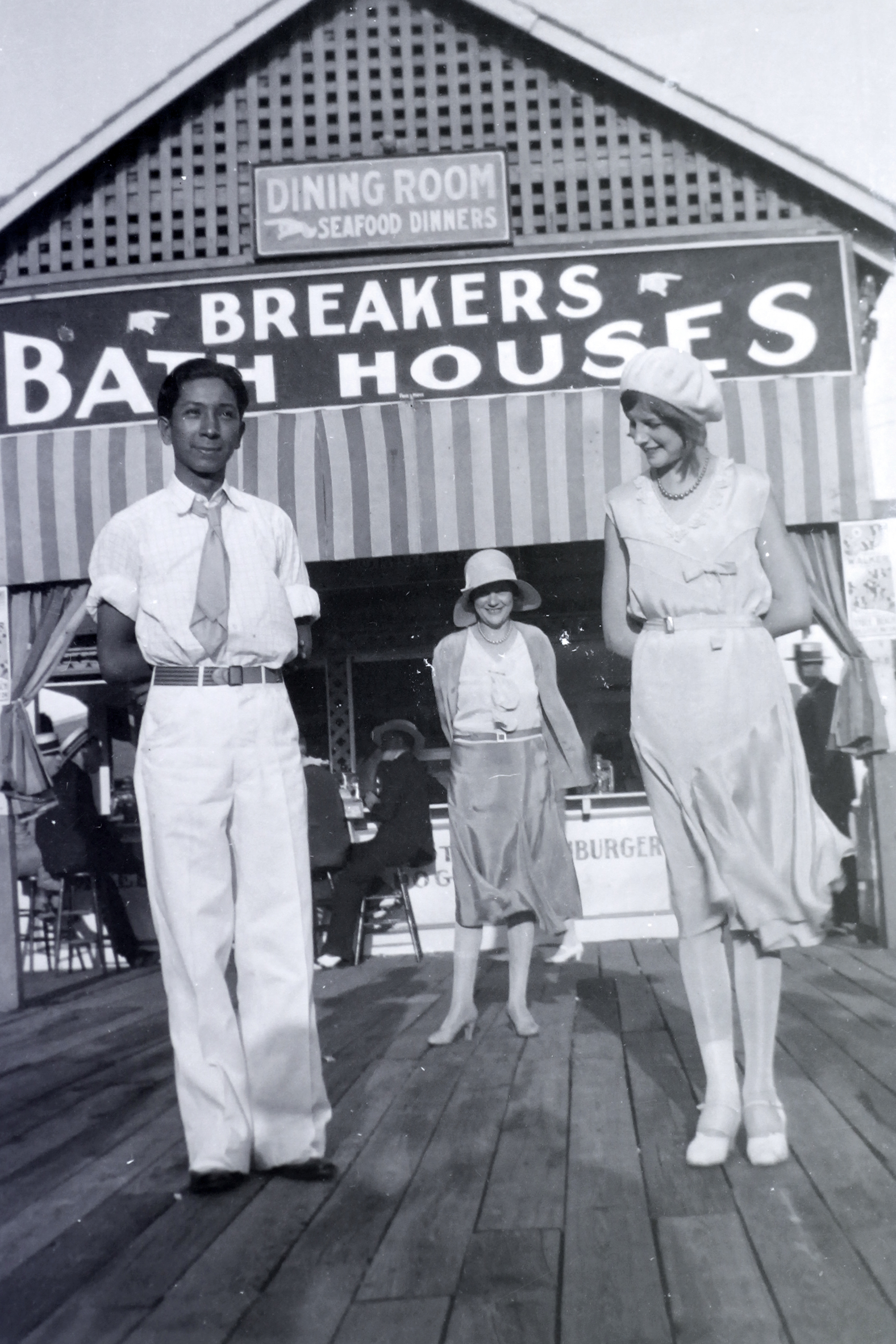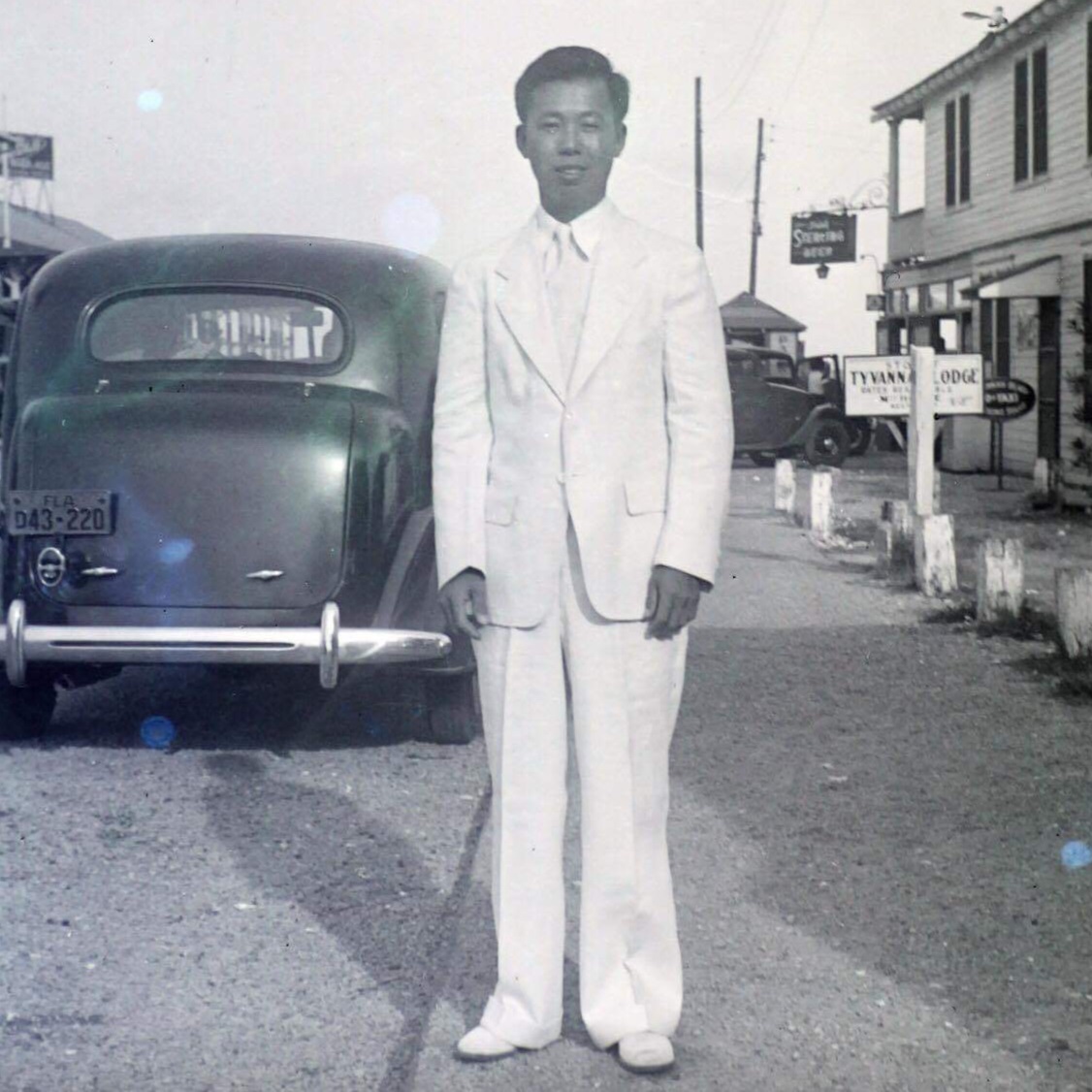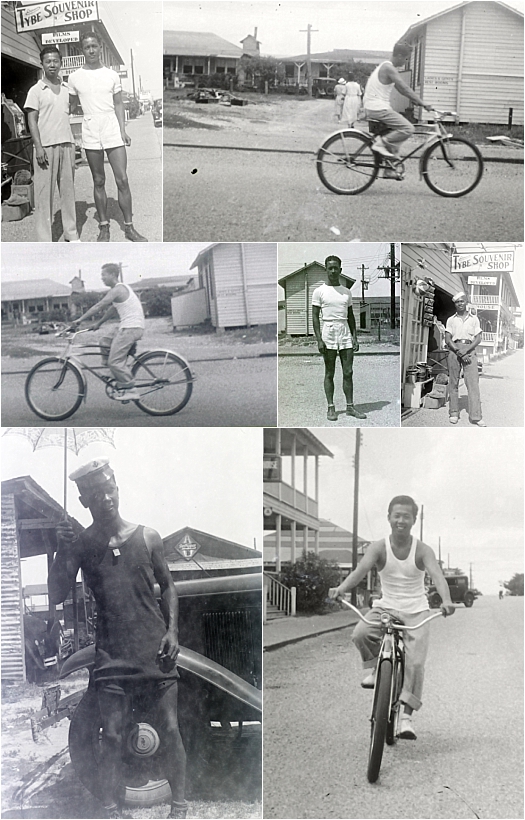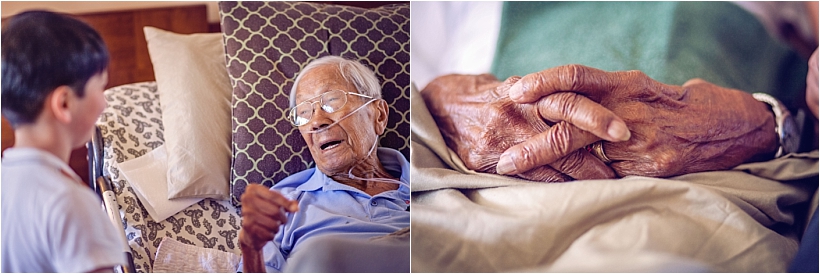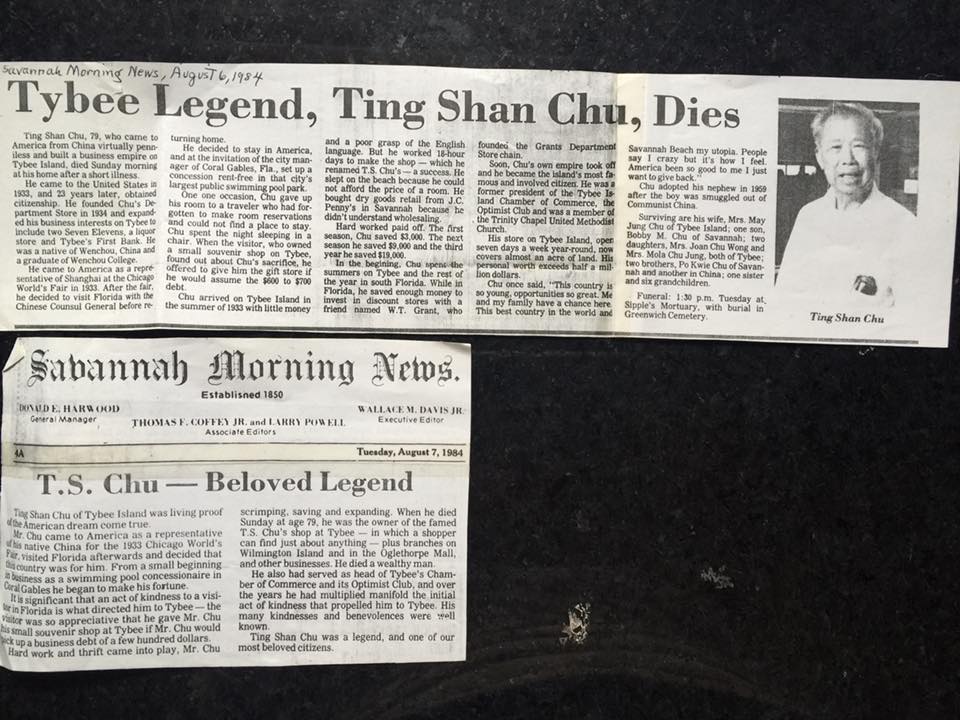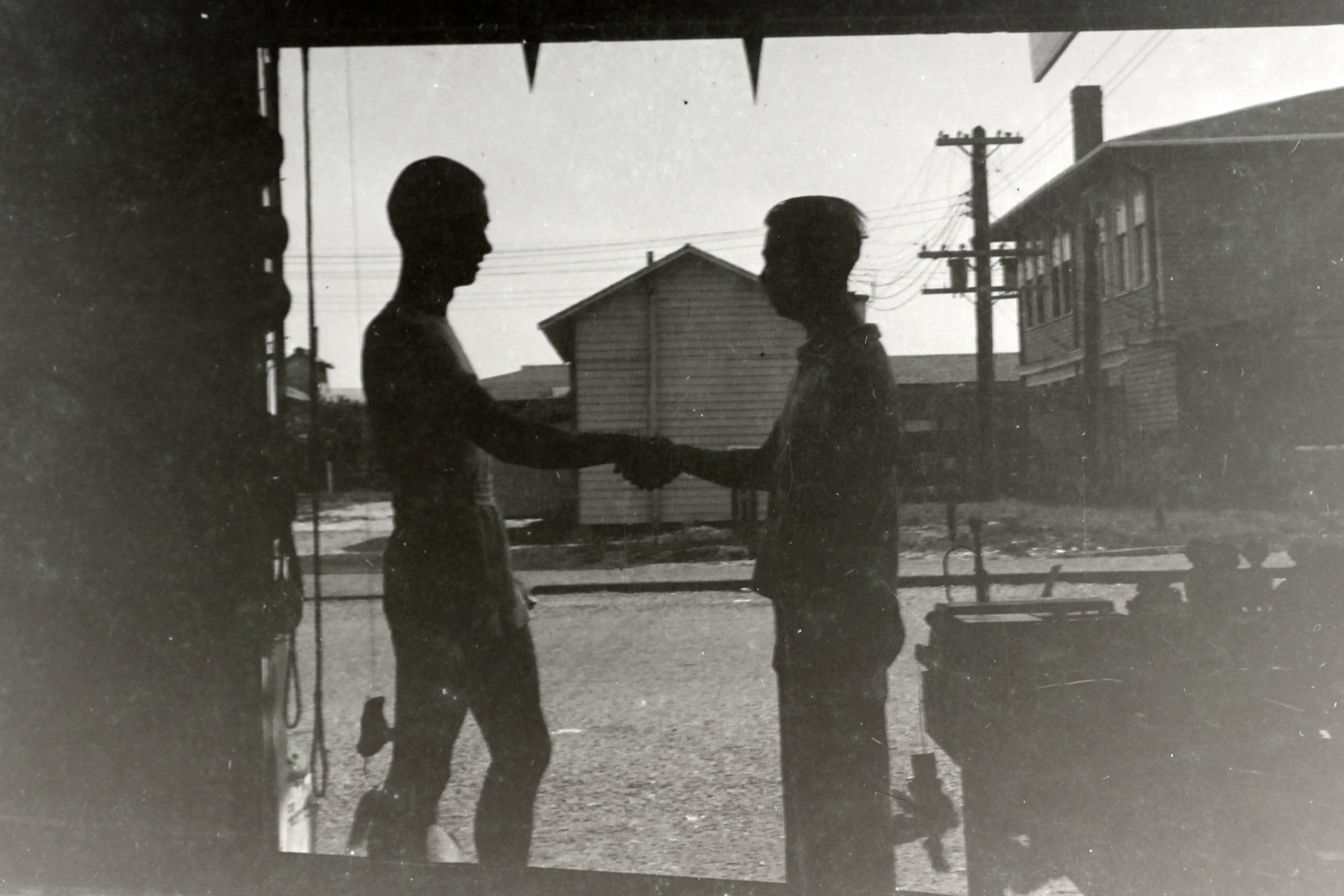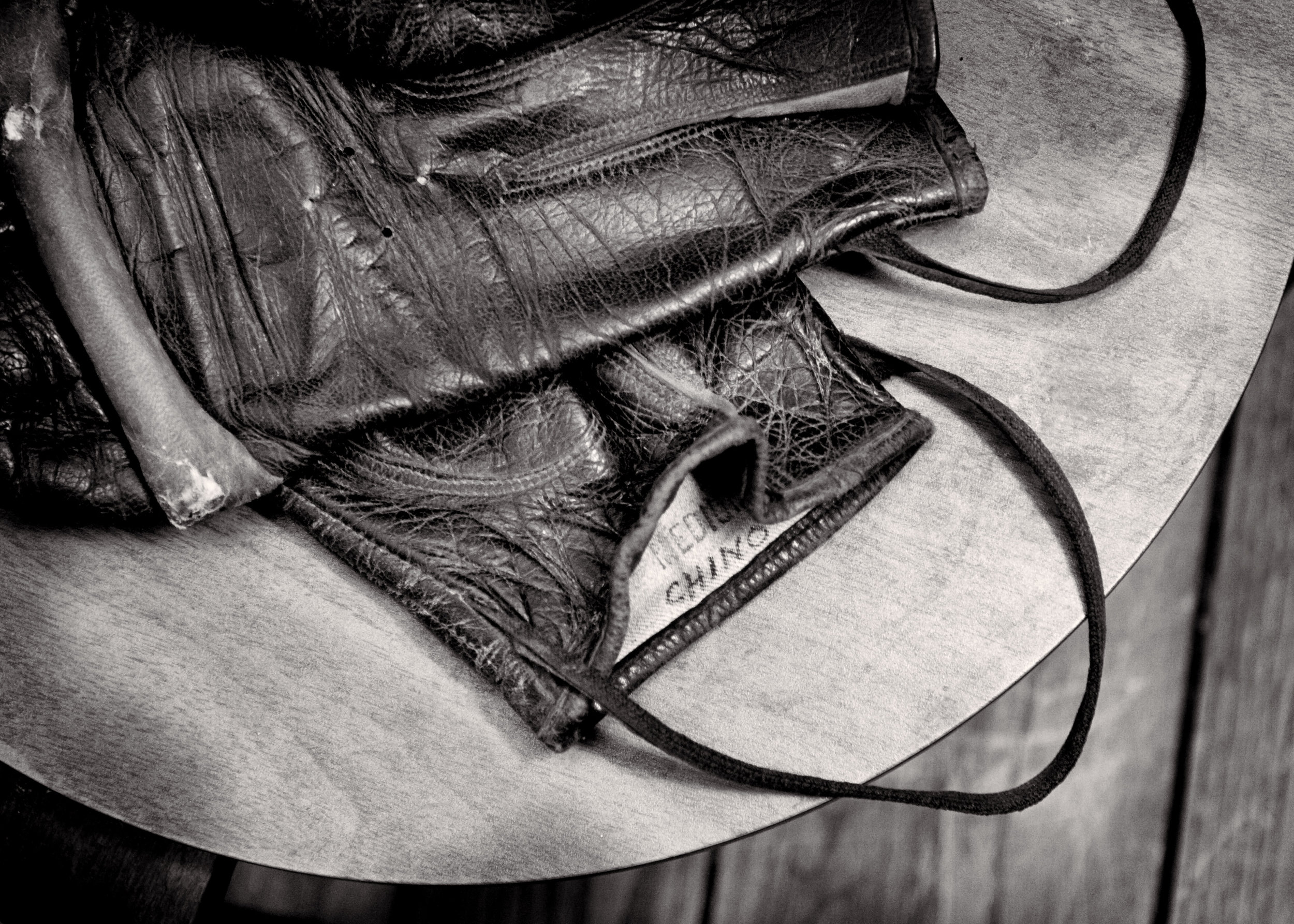Mr. Savannah Beach

No summer trip to Savannah, GA, was complete without Dad driving us out to Tybee Island to splash in the surf, build sand castles and moats, and my favorite: look for air bubbles in the sand and dig with all my might to catch the baby clams that were deep-diving away from me with impressive speed and agility.
My hands often came up empty but with perseverance I found I would eventually pull up a fistful of wet sand, and as it drained away down my arm, there would the treasure be, left in my palm - a collection of tiny baby clams, the size of my fingernail and in all fruity colors of the rainbow: pink, purple, blue, yellow, red. Every year, I optimistically put them in a glass jar with sand and sea water and brought them home with me to my Aunt GG’s house. I liked to set them on the kitchen table and watch them burrow, my nose pressed against the base of the jar. Inevitably, though, they were dead by morning, laid out on the surface of the sand - shells spread wide, beseeching the heavens. Dad came up behind me and lowered his face over my shoulder to look.
“Aw, that’s too bad. It’s alright, Honey. They need the sun and the movement of the tides,” he said. “Stagnation means death, even for bivalves.”
On the way home from the beach, Dad always said, “Let’s stop at Chu’s.” Chu’s was a warehouse sized gift shop where you could find anything from sunglasses and candy bars to the whole spectrum of household goods made from seashells. Books about “Haunted Georgia” sat next to blow-up rafts and flip-flops. It was a temple to American insouciance. Dad’s favorite, and main reason for stopping - or so I thought - was a “Zero” bar. It was wrapped in an ocean blue wrapper with white letters that cooled you off just to look at it. A delicious combination of caramel, peanut and almond nougat, the bar had a layer of white fudge that made it distinctive, in both flavor and look. I never saw Zero bars anywhere else before or since. Only at T.S. Chu’s, only on Tybee Island. Dad said they tasted like summer.
Ahhh, those were good times. How curious, then, that I spent much of my adult life shunning the beach. This came down to a number of pseudo-philosophical reasons and a few pragmatic ones. For one, I haven’t always been near a beach, growing up in upstate NY, and spending my first decade out of college in Boston. Also, I tan quickly and darkly, and my tan lines don’t fade. In fact, the longest I’ve had an accidental tan line is three years. So even a brief jaunt in the sun requires me to make a potentially years-long commitment to whatever happens there. What am I wearing today? What am I likely to want to wear at any point in the next three years? Can I make the former accommodate the latter? It’s kind of a hassle.
However, I had also come to believe that there were two different kinds of people in the world - curious and incurious - and that it was the latter that lay at the root of most of the world’s evils. I also came up with a mental shorthand for “the Incurious;” it was a person who stays put “unless traveling the world to sit by the pool.” The incurious don’t move, they stagnate. Stagnation means death.
Curious people, by contrast, are born restless; they move like the tides. They are the visionaries, striving, asking the big questions, bending the world to their will. They elevate the conversation, in both literal and metaphorical ways. This type of person travels the world the way others eat food and breathe air - because they have to. They do it to break it (and themselves) wide open, to drink it all in, and spill themselves all out, and to feel the expansion and connection that that blurring of boundaries can bring.
In short, the incurious were clams in a jar and didn't even know it; the curious were free and in the wild.
I considered myself to belong to the latter group, and frowned freely for decades on what I thought of as “sun-worshippers”: people who were just looking to get tan; shallow, lazy beings who skimmed the surface of life - probably going on group vacations and lubricating on Mai Tais. Nothing could interest me less. Also, I’m already tan.
This contrarian view may have been no more or less complicated than a product of adolescence. Most people, as they move through that muddled and treacherous period, first learn to define themselves in opposition to something. That is, we often know what we’re against before we know what we are for, and for a good stretch of time, I was very much against “sun-seeking.” I also idolized my father, who - if he didn’t invent the concept of curiosity - at least brought it to a new level of artistry. He didn’t just sit there and stagnate. He was the daringest doer who ever did do! Didn’t I tell you? He was the real-life “Most Interesting Man in the World.” I wanted to be like him. Sun-seeking was the opposite of all that. The last thing I wanted to do was sit still.
And so I embarked on a life of curiosity and doing - saying yes to life’s invitations, asking why about everything, and when appropriate, “Why not?” I pushed myself to the next level, the next accomplishment, the next mastered skill, the next feather in my cap and the next notch in my belt. To not do this, it seemed to me, was to “sleepwalk through life,” and I got plenty of positive reinforcement along the way. People began to see me as impressive and I got hooked on the feeling, to the extent that I began to internalize the idea that my true worth lay in my deeds. I determined to do something even bigger next time.
Until here I am today: a PhD in archaeology; a multi-lingual former college professor; author of numerous peer-reviewed articles as well as a book reviewed as a work “of impressive interdisciplinarity” and “of real historical significance.” I am an international speaker; have a second-degree black belt in Taekwondo; and am a pretty decent pianist. I’ve also been “Best Photographer” two years running in my region; and have a side-business as a Chinese Brush Painter. You get the idea. I’m a “Jack of all trades, master of most.” That may not sound like “sleepwalking,” but even so, I could argue that it was its own kind of trance. Conceive, reach, improve, perform; perfect, achieve, master, repeat. Stillness is stagnation, stagnation is death. March. March. March. March.
The thing about living in a trance - whatever that may look like for you - is that eventually something will happen that shakes you awake and you will realize that what you have done and who you have been thus far - no matter how much you have relied on it or how much it has defined you - can carry you no further. You must define yourself a second time or die. For me, that day came on March 3, 2016. Dad slipped silently away in my arms, and I said to myself, “I’m not going to survive this. At least, not in any form recognizable to me.” And I was right.
Life Guard
Dad was a lifeguard in his youth. He surveyed the pool at the local Sheraton; and cruised the beach on Tybee Island, looking for riptides and any silent flailing or bobbing in the surf. It was just a job; the truth was, not all jobs were open to him, being a person of color in the Deep South of the 1920s and 1930s. He shared alternately harrowing and swashbuckling tales. I shuddered to hear of the day a shark ate a boy’s heel for lunch, but thrilled at the thought of riding giant sea turtles. To turn left, he said, hold the left flipper and let the right one do the work; to turn right, hold the right flipper and let the left one do the work. Lift at the collar to prevent them from diving.
My cousin, Jerry, said to me once in her sweet Georgia lilt, emphasizing each word as it dropped from her lips, “Alexka, your father was a GORGEOUS ATHLETE.” She let the words hang in the air for a minute, then continued brightly, “He was just fun to look at, you know? I used to take my friends to the Sheraton pool down the street and watch the girls fall over him, and the way he could do those dives, with all the twists and flips and things. I loved it. Everybody wanted to be close to him, but he was MINE, you know. I was proud of him. That was my Uncle Earl!”
About a year before Dad died, I found a box of old negatives in my parents’ basement (described in detail in Ghostwriter). These never-before-seen photos documented a sweeping, audacious, storied life, carried out with almost impossible good cheer. They were an essential part of my learning to let go of the man I loved so well. With a life like that, the pictures seemed to assure me, how can there be regrets?
I saw all of my aunts and uncles, beloved faces writ young, oversized personalities, all. I “got to know” my grandparents for the first time, and I steeped myself in that life for many months while I feverishly digitized each and every negative, some 50 years worth. I seemed to be laboring under the belief that if I could only find “the right one,” it would contain the seeds of my salvation. I plowed through the box, whipping myself into a lather to “finish,” deep in my trance of doing.
I was somewhat surprised at how many of the pictures I found were taken at the beach - where no one was really doing anything.
Looking at these pictures, in fact, the phrase “Dad went to the beach like it was his job” came to mind. This was no less true for the fact that he was a life guard and it actually was his job. Look at all the smiles! Look at the gaiety! These were some of the toughest times in American history to be non-white, but who would know it?
Would you know that even having graduated from high school (remarkable because there were no high schools for non-whites in Chatham county at that time) and entered college, Dad didn’t have a lot of other options for work because of discrimination? Would you know from the interracial mingling seen here between him, his siblings, and their partners, spouses and friends that Georgia had some of the toughest anti-miscegenation laws in the country? Would you know that, while Dad was generally welcomed in white homes as part of a group of friends, that welcome only lasted as long as his anonymity? And that as soon as he distinguished himself as something special - which was inevitable - he found his way barred by immovable fathers standing in doorways?
I began to see that the beach was a respite from the blazing heat of a Georgia summer, but also the infernal fires of a racist society. Social codes relaxed there. It brought relief and laughter. One could let his guard down, just be human, and, unmolested, maybe get quiet for a moment or an hour. You can’t imagine yourself a better world or find your place in it if you can’t get quiet for a minute to see it.
When Dad was an older man - all throughout my childhood and adolescence - the big joke was how any time we looked over at him in his living room chair, he’d be sitting there with his legs crossed and his eyes closed. Someone would say, “Dad! Wake up!” And he would open his eyes and look at us levelly and say, “I wasn’t sleeping.”
Okay, sometimes, he was definitely sleeping. But many times he really wasn’t. I like to say he was dreaming. While I rely on apps and spoken guidance, sometimes drum beats, to help quiet and empty my mind, Dad was like some kind of mythical shaman. He could just close his eyes and he was there. Seeing things. Dreaming them into being. It was no accident that he was remembered by more than one mourner at the memorial after his death as “a little bit magic.”
Maybe the beach was the first place Dad learned to tap in to that magic. And maybe this was why, in his 70s, when he had survived the moral injury of war; divorce, disappointment, and failure; the loss of parents, siblings, and friends of the heart; he was still dragging us out to Tybee Island and taking us to Chu’s. The sun was always shining there, and he knew what kind of magic you could find with a little sun to light the way.
I startled at the realization. Was Dad - athlete, scholar, warrior, holder of 13 patents - a sun-seeker?
A Tale of Two Legends
Although most of the faces in the box of negatives were familiar to me, there were a few people I didn’t recognize, and one in particular who piqued my curiosity. He was a young Chinese man - not family - who seemed to spend a good deal of time capering about with Dad at the beach. There they were, shaking hands, laughing, riding bikes, posing in both formal and silly attire…. Who was he? I didn’t know and as Dad’s needs got ever greater in his final months, I just never got around to asking. I was consumed with anticipatory grief.
One day, as I was sitting alone by Dad’s home hospice bedside, the pump and whir of the oxygen machine murmuring quietly in the background, he turned his head on the pillow, crinkled his eyes at me and, gasping a bit between words, said, “Tell me about your friends, Honey.” Most of our conversation at this point consisted of easy prompts like this, followed by my talking and his listening quietly - eyes closed, dreaming.
I stroked his hand, gnarled and soft, in mine and began to talk quietly to him about people I knew who liked to ask the big questions and plumb the dark depths with me, the ones I could count on to celebrate my victories and weather my disappointments with me, the ones who knew when reverence or irreverence was called for and never confused the two. There weren’t very many. “Well, you only need one or two,” he said.
It was really a final act of love. Knowing that I was drowning in darkness and could see no future without him, he was helping me remember how to make one, how to turn toward the light. Only, like Socrates, or a Zen master, he didn’t give me the answers. He just posed the important questions, and trusted I would take it from there.
Birds of a Feather Flock Together
Not long after Dad had died, I was sitting on the floor by his now-empty bed, rummaging listlessly through some of his files, when I came upon a newspaper clipping. The headline read, “Tybee Legend, Ting Shan Chu, Dies.” Ting Shan Chu??? Was this the “T.S. Chu” who sold flip flops and Zero bars?
Although aged by several decades, I couldn’t mistake that face. It was the young man from Dad’s old photos. He was T.S. Chu! We didn’t go there to get Zero bars; Dad was going to visit his old buddy’s place and whatever memories came up with it. The clipping was an obituary in the Savannah Morning News, with the date “August 6, 1984” scrawled in GG’s instantly recognizable script in the margins. She must have clipped the write-up and sent it to Dad. His old friend had died.
I read on.
“Ting Shan Chu, 79, who came to America from China virtually penniless and built a business empire on Tybee Island, died Sunday morning in his home after a short illness.”
He had come as a representative of Shanghai to the Chicago World’s Fair in 1933, but on a trip to Florida thereafter, he decided he didn’t want to go back home.
“Ting Shan Chu of Tybee Island was living proof of the American dream come true. […] From a small beginning in business as a swimming pool concessionaire in Coral Gables he began to make his fortune.
It is significant that an act of kindness to a visitor in Florida is what directed him to Tybee - the visitor was so appreciative that he gave Mr. Chu his small souvenir shop at Tybee if Mr. Chu would pick up a business debt of a few hundred dollars.
Hard work and thrift came into play, Mr. Chu scrimping, saving, and expanding. When he died Sunday at age 79, he was the owner of the famed T.S. Chu’s shop at Tybee, in which a shopper can find just about anything - plus branches on Wilmington Island and in the Oglethorpe Mall, and other businesses. He died a wealthy man.
He also served as head of Tybee’s Chamber of Commerce and its Optimist Club, and over the years he had multiplied manifold the initial act of kindness that propelled him to Tybee. His many kindnesses and benevolences were well known.
Ting Shan Chu was a legend, and one of our most beloved citizens.”
I dropped the clipping to my lap and stared at the ceiling, letting out an audible guffaw. PRESIDENT OF THE OPTIMIST CLUB?! Of course Dad would be cavorting with such a one, and have sniffed him out within weeks or even days of his arrival. The pictures show Mr. Chu hadn’t even changed the name of the shop to “Chu’s” yet. It must have been his first summer! Birds of a feather really do flock together. Both lived the dream and died legends in their own right.
That’s why he prompted me to think about who my friends were before he died. He knew: you can weather every storm, and reach any heights, if you have the right people around you. Make sure they are the kind that lift you up, and help you learn, heal and grow; the kind that you yourself aspire to be. They don’t have to be the President of the Optimist Club, but it wouldn’t be a bad thing.
Sun-Seeking
Dad was a sun-seeker. I see it now, crystal clear. But his days at the beach were just the most literal manifestation of a much deeper mode of being: that of the resilient, magical optimist; always drawn back from dark places to “the sun,” which was who- and whatever had heart and kept him vital and present; always rebuilding when earlier foundations cracked or fell apart; always winking at fate, and even opening the door to let her in and sit awhile. When that happened, like a plant that has found itself stuck in a shady corner, he just turned his face to the light and continued to reach and grow. By the time I came around, he had survived war, divorce, disappointment, failure, and injury; and said goodbye to parents, siblings, and many, many friends. Yet I only knew him as cheerful, generous, sometimes bawdy, and warmly reminiscent. Only a sun-seeker can do that.
Dad sought and found the sun in his life. Again and again and again, and it started at Savannah Beach. Knowing how to drop everything and sit and play in the sun both reflected and perpetuated an uncanny ability to wear the circumstances of his life - whatever they were - as a loose garment, one that he could shift around in and not be too defined or constrained by. After all, loose garments can be taken in or taken off, thrown away, replaced with new ones. This ability led to a lifetime of resilience and optimism in hard times.
He had also stumbled early on to the fact that beyond all the doing (which was legion with him!), there is a being, which underlies, predates, and will outlast everything else. It is unassailable, unbreakable, eternal. HE was not his suffering. HE was not his doing. He was simply his being. Sun-seeking was one, very effective, way to shed the outer trappings and sink back into that being, where there is no crowding ego, no time, no good or bad; only presence, only flow. This is where a person can recharge, restore, and reboot in the face of every hurt. But if you are too busy doing, you will never be able to find that being, and healing, growth and renewal will elude you.
Having, Doing, Being - the Anatomy of an Awakening
I don’t remember the first time I was ever accused of being a “human doing” rather than a “human being,” but I heard the joke often and from a variety of quarters, from childhood until…well, most recently, a few weeks ago. The struggle is ongoing, folks.
But what I learned on the day that Dad died is something that I think he had known all along: that there comes a time in everyone’s life when one’s doing has been exhausted. For all my lifelong devotion to hustle, and then the absolute frenzy of “doing” that went along with easing his transition out of this world, the fact was, no pursuit or achievement, no feather in my cap or notch in my belt, no plan…was going to stop my worst fear from coming to pass. And when they finally wheeled Dad’s body out the front door in a bag of burgundy corduroy, I was so emptied of every impulse, every feeling, every ability that I was a bit surprised to find myself still there. The doing had ceased but somehow I had not. Here I was sitting in Dad’s overstuffed lift chair, almost non-responsive and staring blankly into space. It was if I had defined myself so completely by deeds - had never really learned to just be - that now finding myself incapable of even the barest of intentions, I would suddenly go “poof” and disappear. But I didn’t.
I read recently somewhere that there are three levels of consciousness: having, doing, and being. The child and adolescent is preoccupied with “having” in order to feel safe (things, toys, a house, clothes, family, friends); the young adult is obsessed with doing (establishing careers, differentiating and proving themselves, exploring and achieving); and the wise person is content with just being because the simplicity of one’s presence is the only thing that’s real. All else is an illusion or a projection of the egoic mind.
Well, Dad’s death went off like a hydrogen bomb in my life and I found for the first time that I couldn’t do anything anymore. I didn’t prepare even a single meal for my family in three weeks. I cried all night, got up late, washed myself only rarely, trudged around in smelly pajamas, and lost my composure in every room, every time of day, and in every kind of company. And yet, while nothing that had ever defined me until this point was operational, my being persisted. Absolutely nothing could eradicate or diminish it. It just went on and on. I realized, perhaps for the first time, that I - the real and actual me - was not anything that I did, but simply something that I was. I…simply am. I had no choice but to sink in to it and, because I was so enfeebled, have patience and faith that what I needed would make its way to me.
I existed and persisted in that formless and flexible state for many weeks and it made me feel…fearless. Doing absolutely nothing began to make me feel like maybe I could do anything. My battery was recharging, I could feel the energy rising. Grief also proved a gateway to something invaluable in me that had nothing to do with being seen or heard. I had never spent a day, let alone weeks or months, completely unconcerned with being seen or heard. After a lifetime of relentless pursuit and growth, I was learning the value of stasis and surrender. The fact that I had no choice in the matter did not lessen the impact of that learning.
I kept pictures of Dad at the beach everywhere, to remind me of the beauty of being. On my desk, by my bed, in my sock and underwear drawer. I studied every detail and gazed and gazed. What can we learn from a day at the beach? I imagined myself merging with the pictures before me, feeling - really feeling - what the people in them were feeling. I heard the water and smelled the salt air; felt the grit of the sand on my skin and saw the gulls circling above. I realized that as a human doing, I had lived most of my life in my head. But a human being enjoys a more physical, embodied, sensory experience, and - as I had been learning over the previous weeks - actually takes fuel from it, which can then be converted to intentional and empowered action. What could be more grounding and sensory than a day at the beach? It is equal parts rest, pleasure, and exertion. There is warmth, grit and wetness on your skin; ocean breeze in your hair; sound of waves in your ears; taste of salt at your lips; smell of seaweed in your nose; gulls and scudding clouds in your sights; and memories and daydreams behind closed lids.
Where Do You Want to Go?
I had thought that in order to live life to the hilt, as Dad had done, I had to go non-stop. I was wrong by half. The most creative and fulfilling period of my life has come only since grief stopped me in my tracks three years ago. Since then, I became my city’s “Best Photographer” two years running; started my Chinese brush painting business, Rising Phoenix Arts; and created this writer’s blog. A supernova of creativity burst forth out of the nothingness that followed Dad’s death. It was a creativity I had been pursuing all my life. And yet now here it was, just gushing forth, as unsought as it was unstoppable. There was a connection between the being and the doing, I could feel it.
And so now I try not to fear stasis. Indeed, I try to be unapologetic about building absolute idleness, even, into daily life. If I am having trouble with something, I do what I can and then let it go. I alternate purposefully between intention and surrender. I am also trying to have more fun.
The truth is, I think we need both to inhabit our most fully realized selves. There is a time for waiting - resting, restoring - which I am still learning how to do, but then also a time for boldly stepping forth to pursue and meet our destiny. Neither one is to be discounted. We can do it alone, or - and this was Dad’s wish for me, for it had helped him immeasurably in his own life - in the company of like-minded souls. The right kind of company accelerates everything, and makes it more potent.
“And if you ever get tired, as you will,” his pictures seem to say to me, “go and seek out the sun.” Because it is not just people that get you through, but also your ability to return and reconnect to what is vital, what sparks the life force in you, what enables you to dream and to see a future you want to be a part of. For me? That’s my family and my creative endeavors. Those are metaphorical suns for me. But I also go for long walks every day. And yes, when the kids asked if we could go to the beach on Friday, which was their last day of school, I suppressed the old urge to say “No, I have stuff to finish up before the weekend,” and said, “What a good idea! That sounds fun.” And it was. I napped, guilt-free, in the sand, and watched a cloud change oh. so. s l o w l y . . . . When I came home, I had overcome my writer’s block on this post, which is why you’re reading it today. See how it works?
Sometimes you have to take a leap of faith to sun-seek. One afternoon last month (May), after news of another mass shooting broke, I did the only thing I know how to do anymore when I’m desperate. Though I was in no state to see how it would help, I went for a walk to shake off my anger and despair at the hounds of Hell that have taken over our country and, as far as I can see, are killing children the same as if they had held a gun to their faces and pulled the trigger themselves. And don’t get me started on the evil taking place at the southern border. The weight of it all oppressed me and left me frantic. So I took a chance, dropped everything, and left the house. I had no destination, and my only intention was to surrender all intention.
About a mile into it, I had found no relief and in fact was spinning myself into every greater dervishes of anguish. I’m seeking sun, goddammit. That’s what I’m supposed to be doing, right?! So where is it? I sat down, suddenly needing stillness and quiet. My own walking was driving me to distraction. I said to myself “Breathe. Breeeaaaaathe. Wait for gratitude.” My mind quickly flipped through my many gifts: my children, my cats, my health, the beautiful sunny day, the lovely town I was stomping through. I sat and sat, and counted my blessings, but it all sounded like nothing. I didn’t feel grateful for any of it. And then I started crying - I was lost - because is it reasonable to ask normal people to “find the light” in perpetual, perennial, never-ending darkness?! Why must the onus always be on ourselves? And when half the country just “womp-womp”s to the most depraved and egregious happenings anyway?
An old woman was struggling to get her car in the parking spot in front of me, pulling in and out repeatedly to get the angle right, peering determinedly back and forth over her steering wheel and out the side window. I watched with vague interest, wiped my eyes and, voice thick with emotion, muttered, “I can’t do it today. I can’t find the light anywhere. I’m surrounded by darkness. Help me.”
The old woman got out of the car and I startled to see her wander directly over to me, as if it were her mission to do so, maybe even her whole reason for coming to town. She came right up to me and said, “Hello! I just want to tell you that you are sitting in the most beautiful sunbeam right now. It is shining through the brim of your hat, casting all these marvelous sparkles of light over your face. It’s beautiful. I wish you could see it. Say, can you tell me where State Street is?”
I was stunned. Here I was, stomping around demanding to be shown the light, and an old woman stopped to tell me I was already sitting it, if only I could see it.
I felt the thrill of Big Magic run through me.
Like, Comment, and Share!
Although the buttons below work, Squarespace is currently struggling with a bug that erases the tracking at random. Please don’t let low or no numbers shown deter you. Likes and shares still help boost my visibility, even if the numbers don’t stick around to show it. Thank you, friends!
